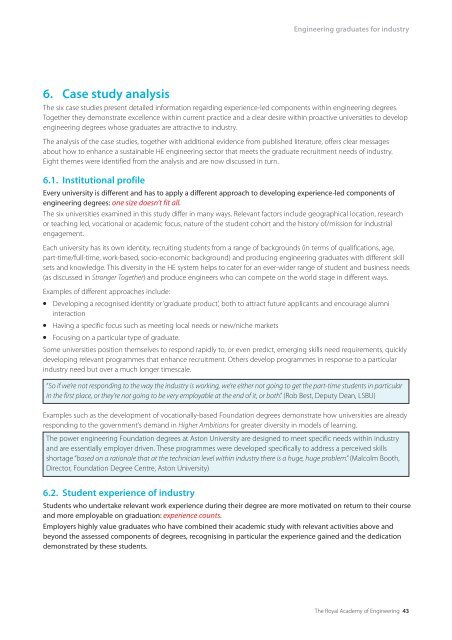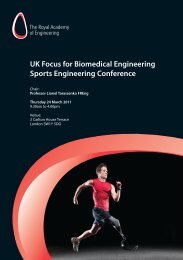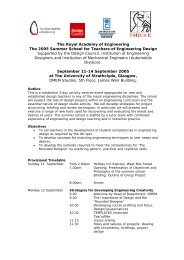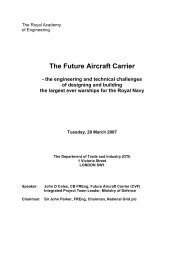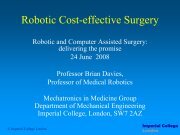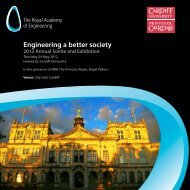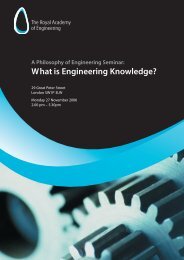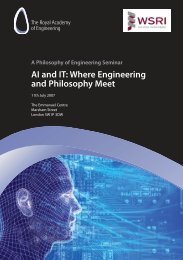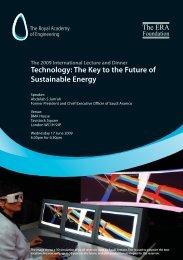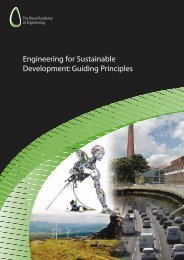Engineering graduates for industry - Royal Academy of Engineering
Engineering graduates for industry - Royal Academy of Engineering
Engineering graduates for industry - Royal Academy of Engineering
Create successful ePaper yourself
Turn your PDF publications into a flip-book with our unique Google optimized e-Paper software.
<strong>Engineering</strong> <strong>graduates</strong> <strong>for</strong> <strong>industry</strong><br />
6. Case study analysis<br />
The six case studies present detailed in<strong>for</strong>mation regarding experience-led components within engineering degrees.<br />
Together they demonstrate excellence within current practice and a clear desire within proactive universities to develop<br />
engineering degrees whose <strong>graduates</strong> are attractive to <strong>industry</strong>.<br />
The analysis <strong>of</strong> the case studies, together with additional evidence from published literature, <strong>of</strong>fers clear messages<br />
about how to enhance a sustainable HE engineering sector that meets the graduate recruitment needs <strong>of</strong> <strong>industry</strong>.<br />
Eight themes were identified from the analysis and are now discussed in turn.<br />
6.1. Institutional pr<strong>of</strong>ile<br />
Every university is different and has to apply a different approach to developing experience-led components <strong>of</strong><br />
engineering degrees: one size doesn’t fit all.<br />
The six universities examined in this study differ in many ways. Relevant factors include geographical location, research<br />
or teaching led, vocational or academic focus, nature <strong>of</strong> the student cohort and the history <strong>of</strong>/mission <strong>for</strong> industrial<br />
engagement.<br />
Each university has its own identity, recruiting students from a range <strong>of</strong> backgrounds (in terms <strong>of</strong> qualifications, age,<br />
part-time/full-time, work-based, socio-economic background) and producing engineering <strong>graduates</strong> with different skill<br />
sets and knowledge. This diversity in the HE system helps to cater <strong>for</strong> an ever-wider range <strong>of</strong> student and business needs<br />
(as discussed in Stronger Together) and produce engineers who can compete on the world stage in different ways.<br />
Examples <strong>of</strong> different approaches include:<br />
●<br />
●<br />
●<br />
Developing a recognised identity or ‘graduate product’, both to attract future applicants and encourage alumni<br />
interaction<br />
Having a specific focus such as meeting local needs or new/niche markets<br />
Focusing on a particular type <strong>of</strong> graduate.<br />
Some universities position themselves to respond rapidly to, or even predict, emerging skills need requirements, quickly<br />
developing relevant programmes that enhance recruitment. Others develop programmes in response to a particular<br />
<strong>industry</strong> need but over a much longer timescale.<br />
“So if we’re not responding to the way the <strong>industry</strong> is working, we’re either not going to get the part-time students in particular<br />
in the first place, or they’re not going to be very employable at the end <strong>of</strong> it, or both.” (Rob Best, Deputy Dean, LSBU)<br />
Examples such as the development <strong>of</strong> vocationally-based Foundation degrees demonstrate how universities are already<br />
responding to the government’s demand in Higher Ambitions <strong>for</strong> greater diversity in models <strong>of</strong> learning.<br />
The power engineering Foundation degrees at Aston University are designed to meet specific needs within <strong>industry</strong><br />
and are essentially employer driven. These programmes were developed specifically to address a perceived skills<br />
shortage “based on a rationale that at the technician level within <strong>industry</strong> there is a huge, huge problem.” (Malcolm Booth,<br />
Director, Foundation Degree Centre, Aston University)<br />
6.2. Student experience <strong>of</strong> <strong>industry</strong><br />
Students who undertake relevant work experience during their degree are more motivated on return to their course<br />
and more employable on graduation: experience counts.<br />
Employers highly value <strong>graduates</strong> who have combined their academic study with relevant activities above and<br />
beyond the assessed components <strong>of</strong> degrees, recognising in particular the experience gained and the dedication<br />
demonstrated by these students.<br />
The <strong>Royal</strong> <strong>Academy</strong> <strong>of</strong> <strong>Engineering</strong> 43


